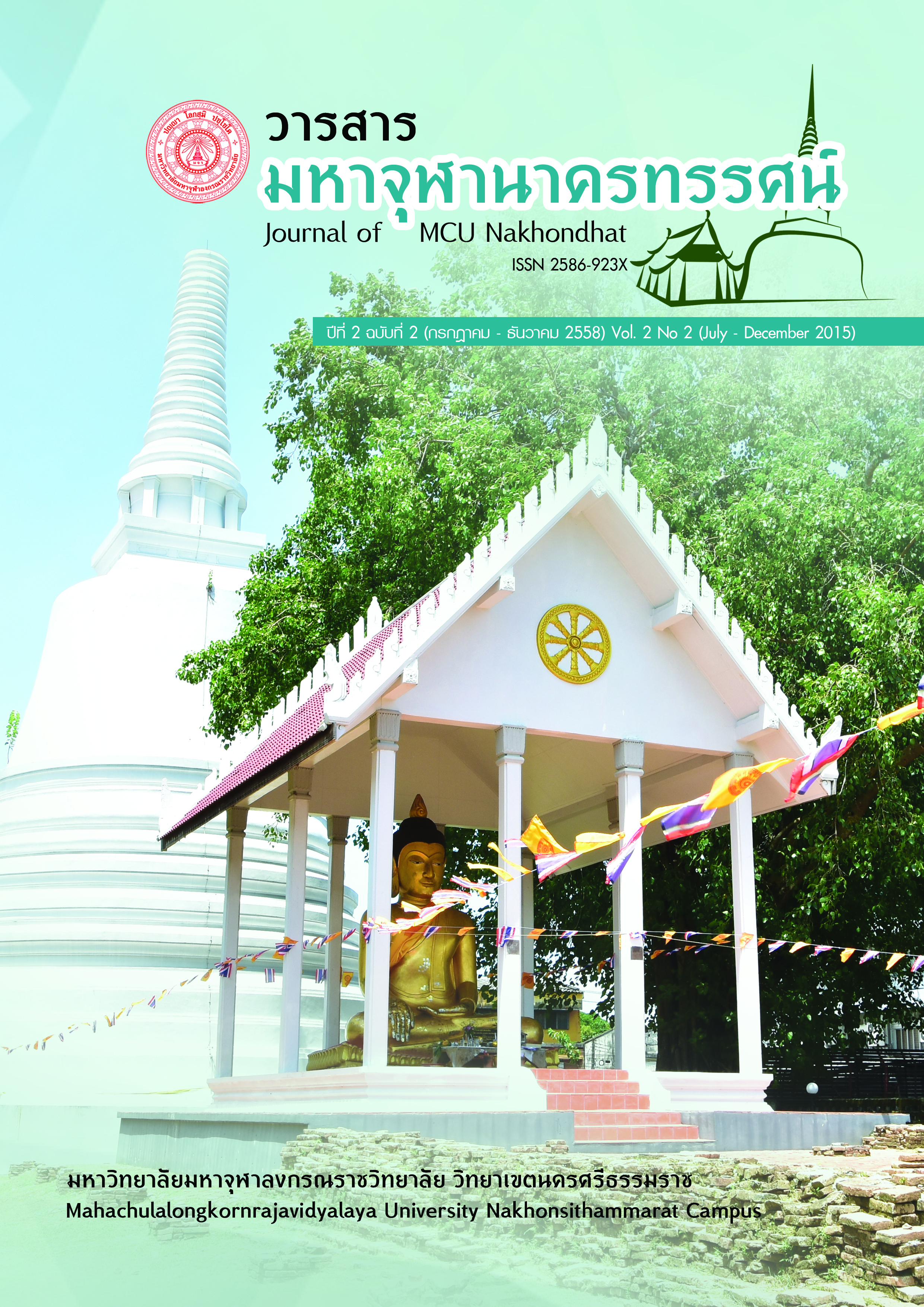A STUDY OF THE MONK ROLES IN SOCIAL DEVELOPMENT IN BUDDHIST WAYS : A CASE STUDY OF PHRAKHRUPRAPATTHAMMAWITHAN (MING PAPATSARO)
Main Article Content
Abstract
“A study of the monk roles in social development in Buddhist ways : A case study of Phrakruprapatthammawithan (Ming Papatsaro), Chief of the ecclesiastical sub-district of Muang-Ngam, Singhanakhon district, Songkhla province. The thesis title on “A study of the monk roles in social development in Buddhist ways : A case study of Phrakruprapatthammawithan (Ming Papatsaro), The objectives were as follows 1) To study the concept on social development according to Buddhist approaches, 2) To study the concept on social development according to Buddhist approaches of Phrakruprapatthammawithan (Ming Papatsaro) and 3) To analyses the role on social development according to Buddhist approaches of Phrakruprapatthammawithan (Ming Papatsaro). The researcher tried to study on document and field study by indept interview, the samples were about 29 persons can divided as follows; 15 ecclesiastics, 14 local scholars, and give some suggestions.
The findings were as follows.
The concept on social development according to Buddhist approaches to emphasize on man development for stronger in physical, mind and wisdom by conduct of good moral, to live on Sacca base on truth, without ignorance, to have self–sufficiency, helping own self for stand on own self and to live happily, the Dhamma principle for applying in social development i.e. Karma principle means to try or effort, Tri-sikkha means behavioral development, mind development and wisdom development, Appamada principle means no waiting time and carefulessness and freedom principle for self living i.e. own self living and freedom.The concept on social development according to Buddhist approaches of Phrakruprapatthammawithan (Ming Papatsaro) he was kind on people which followed up the Sangha’s act B.E. 2535 which compound in six categories i.e. 1) Ruling to set the living of sangha for regarding on Vinaya temple’s rules, orders and Sangha’s laws. 2) The Buddhism dissemination which emphasized on Dhamma training for expression of kindness on general people. 3) public service providing which regarded on public sacrifice and social development in many aspects. 4) educational welfare to pre-nursery and having scholar for higher education. 5) religious places, to have the academic school in Phrapariyattithamma study for monks and novices in the temple. 6) public welfare ; to help people who faced on disaster by applying on 8s, i.e. 1) Sangha means to develop monks and novice in the temple and out of temple for more quantity and quality. 2) Sattapurisa means to develop the life quality of scholars around the temple for consciousness on thinking, doing, resolving, responsibility to Buddhism with Sangha. 3) Senasana means to develop religious places, religious things, to have Buddha area, Dhamma area and Sangha area etc. 4) Sombatwat means contaminance, development, applying and to be solved of religious things, to be registered the religious things, land, and wealth as clear and clear. 5) Samana Dhamma means to have religious activities and rituals which regarded on Sangha’s affairs i.e. Dhamma Vinaya study, daily praying, Patimokha praying, to express the offence for purifying, meditation, Dhamma training, to look after the preceptor, armgathering (armsfood), to be clean and clear temple as the place for good training of people. 6) Sangadhikara means ecclesiastics i.e. to develop the Sangha’s affair by understanding and responsibility, to be co-operated between temple’s work and government’s policy and Sangha’s policy i.e. ruling, religious education, public service providing, dissemination, educational welfare and public welfare. 7) Sawasdikara means to be collected budget for Sangha foundation registration for accommodation of monks and novices in temple and service providing to social welfare both government and private sectors as satisfy and 8) Sadharanasangaha co-operated with government’s policy by campaigning on life quality, to be solved the poverty, sick, ignor and to be helped people in the cases of disasters etc.
Article Details
References
พ่วง สุวรรณรัฐ. (2553). ทัศนะเกี่ยวกับโครงการอบรมพระภิกษุส่งเสริมการพัฒนาท้องถิ่นรายงานกิจการโครงการอบรมพระภิกษุเพื่อส่งเสริมการพัฒนาท้องถิ่น. กรุงเทพมหานคร: โรงพิมพ์กรุงนครการพิมพ์.


